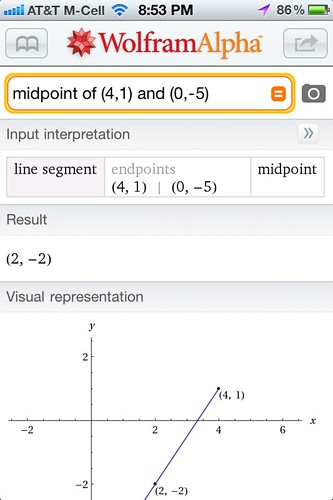Like Khan Academy, WolframAlpha is a website everyone should know about– especially anyone taking a math class or helping someone else enrolled in a math class. This evening, I used WolframAlpha to check several different problems my son was working for an end-of-year assignment in his Geometry class. You can see the syntax I used in the screenshots below. Wolfram Alpha supports solutions for complex problems using straightforward language. This kind of computation isn’t possible with a ‘normal’ calculator. As with a calculator, a powerful tool like WolframAlpha doesn’t replace the need to understand mathematical concepts and processes, but it certainly CAN make it easier to use those algorithms to solve problems.
Some of the problems (like the initial examples of temperature conversions) could also be done with a simple query to Google, but the more advanced problems definitely could NOT. GoogleGuide.com has a nice collection of techniques for using Google as a basic as well as advanced calculator. Google can’t do everything WolframAlpha can do, however!
Converting from Fahrenheit to Centigrade with Wolfram Alpha
Converting from Kelvin to Fahrenheit with WolframAlpha
Calculating the area of a regular hexagon with WolframAlpha
Solving an Algebraic inequality with WolframAlpha
Calculating a Midpoint with WolframAlpha
In these examples I was using the Safari web browser on an iPad and (in the last example) my iPhone, but I also could have used the WolframAlpha app for iOS. It is currently $3.
How do you think access to amazing tools like WolframAlpha should change how we teach and use mathematics in our schools? My advanced statistics professor still “made us” (as students) work out many of the multivariate analyses calculations by hand even though we had SPSS, because he “wanted us to understand how they worked.” Years later, I remember very little of the specifics of those computational steps, although I retain many concepts. I’m sure I’ll never again work an ANCOVA or MANCOVA by hand on paper. I used ANCOVA in my dissertation, but I certainly didn’t work the calculations by hand. I used SPSS.
Access to tools like WolframAlpha SHOULD change how we teach and use mathematics in middle and high school, as well as college. In most schools today, however, I don’t think it has. Yet.
For more on this amazing tool, see the video, TEDx Brussels – Conrad Wolfram – 11/23/09.
As I side note, I’m thankful I still remember enough of my high school and college math course skills to help Alexander. Tonight WolframAlpha was a big aide, however, speeding up the process of checking answers and helping him identify a few mistakes. I’m not sure how many more years I’ll be able to help him, however, especially if he continues on a math-intensive track to study theoretical physics. That’s what he wants to do at this point, he thinks, but lots can change.
We enjoyed watching episode two of Brian Greene’s NOVA special, “The Fabric of the Cosmos” tonight on AppleTV. It was basically a continuation of the “Talking Science” podcast which Alexander and I made five years ago in 2007. It’s a great thrill as a dad to help my children grapple with big questions. The episode we watched tonight was called, “The Illusion of Time,” and I learned some new things about “perceptions of now” according to the laws of physics informed by Einstein’s relativity. Who knows where my kids will go in the future, equipped with inquisitive minds, amazing tools like WolframAlpha, and the chance to explore new horizons with scientific folks like Brian Greene?!
Technorati Tags: math, mathematics, geometry, algebra, solve
If you enjoyed this post and found it useful, subscribe to Wes’ free newsletter. Check out Wes’ video tutorial library, “Playing with Media.” Information about more ways to learn with Dr. Wesley Fryer are available on wesfryer.com/after.
On this day..
- Robotics, Stories, Stopmotion, Enhanced eBooks, Coding & More at PLAYDATE OKC May 10th – 2014
- Create YouTube Channel with Custom URL (April 2013) – 2013
- Hide FarmVille Status Updates on Facebook – 2010
- Help Needed! WordPress commenting isn’t working (WordPress database error Duplicate entry) – 2009
- Visualizing Twitter – 2009
- Continuing dialog about creativity in schools, student technology skills and content filtering – 2008
- links for 2008-04-29 – 2008
- Collaboration in schools: More reasons we need it – 2007
- Import Garageband Audio at 44.1 – 2006
- Site visit UT College of Education: Year 3 of One to One Computing – 2005





